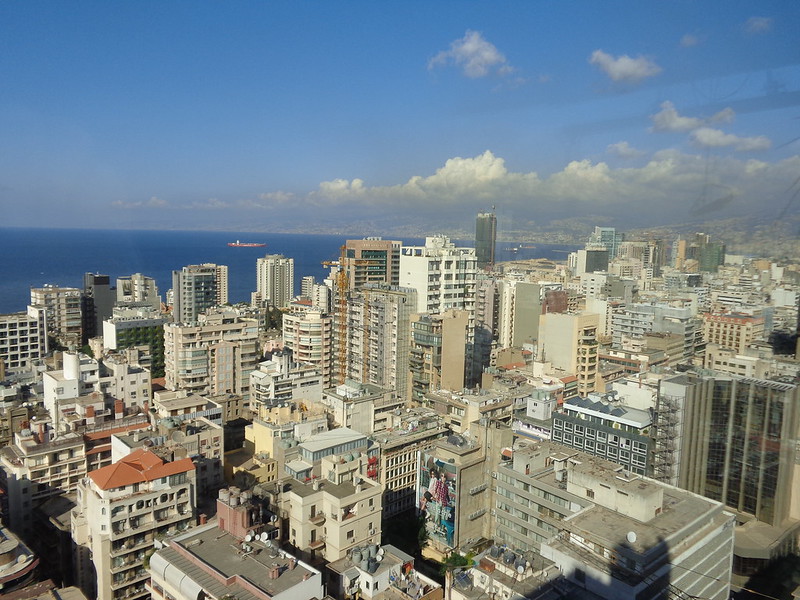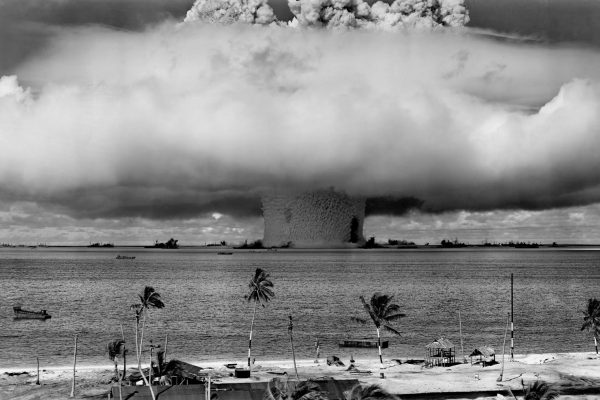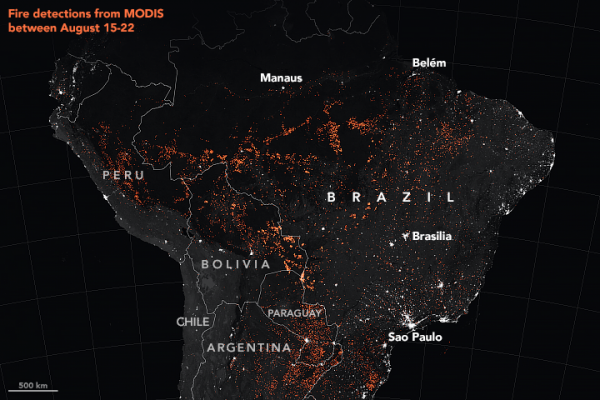A mushroom cloud is a powerful way to inaugurate the birth of a new era. Seventy-five years to the week after the bombs over Hiroshima and Nagasaki signaled the birth of the American era in world politics, an explosion of equal visual intensity marked the end of the Beirut that so many successive generations had come to love.
What was Beirut?
It came of age in 1861 as an entrepôt: for goods, for finance, for ideas. When I first went to Beirut fifty years ago it was a throbbing hive of connectedness—not just with its Lebanese hinterland, not just with its much broader Arab hinterland, but with the world. It played the same role, perched on the Western end of the Asian landmass, that Hong Kong played at its Eastern end. The banks, the oil-services companies, the insurance companies, the media ventures: everyone from West or East who sought to do business with the newly independent statelets of the Gulf, or with the more established oil-rich Gulf states or other parts of the Arab hinterland, would have a sizeable corporate office in Beirut.
Beirut came of age in 1861 as an entrepôt: for goods, for finance, for ideas. It was a throbbing hive of connectedness—not just with its Lebanese hinterland, not just with its much broader Arab hinterland, but with the world.
The whole of Beirut was one roiling mass of commerce, the culmination of a century of building up to that role. Long caravans of TIR Convention tractor-trailers would churn out of the port hauling prepacked loads out of its warehouses, or directly off its ships. They would heave up over the mountains and drive right through the rest of Lebanon without stopping, through Syria, to Iraq and the Gulf. A few miles to the north, the Casino Du Liban staged nightly floorshows of eye-popping opulence. The Chamber of Commerce held dinners in fabulous seaside properties run by major Western hotel chains. The city was a melting pot of ideas, too. Each of the myriad ideological trends that contested for influence in the Arab world—and some from far beyond—would locate one or more publishing outlets there. Politicians and thinkers ousted from other Arab capitals by the coups and counter-coups that had rocked the region since the 1940s would end up in Beirut, propping up the bar at the St. Georges, brainstorming at the Bristol, or drinking endless coffees at one of the French-style café-bars on Hamra.
That city was ringed by slums. The country’s pols tended to call them “suburbs,” but none of those favelas ever resembled what that name means for Americans. And because the city’s power-brokers and the international executives they consorted with did not want to see that poverty as they sped to the Casino or some mountain resort, the city built walls around them. That outrageous economic disparity was a big (intra-Lebanese) motor of the civil war that erupted in 1975.
That was Beirut half a century ago. Today it is likely gone forever.
Four years after my initial visit, I exercised a degree of colonialist chutzpah and moved to Beirut to become a foreign correspondent, following legions of (usually male) Brits who went to the Levant before me in pursuit of that quest. Lebanon was kind to my ambition. Before I was twenty-four the horrors of the civil war that erupted in April 1975 had given me repeated sole-byline front-page spreads in two great international newspapers. Beirut was where I learned to count tanks, bodies, and body parts. . . to differentiate between incoming and outgoing, rockets and mortars. . . to estimate, as the Syrians’ field artillery would “walk” shells toward our area, whether the next one would hit us. And to keep writing down those numbers, times, and other details in my notebook as an obsessive way to get the story right, to keep my focus, to stave off the horror.
For me, Beirut was recording Bashir Gemayel’s exact words as he boasted of the massacres his fighters had committed when they seized Tel al-Zaatar refugee camp from its Palestine Liberation Organization (PLO) defenders. My Beirut was driving between two different branches of my then-husband’s family—or between two different political leaders—in the two sides of the divided city and that lurching grip of fear as you’d come to the Mathaf crossing-point from either side. One time, and one time only, I froze up and nodded yes when the male Reuters colleague in the passenger seat asked if I wanted him to take over. Slowly, with the car stuck in the middle of the broad empty boulevard, we exchanged seats, our eyes glued to the rooftops where reports had said there were snipers.
Beirut then was so many different explosions and rushing to report on the carnage, though always wary of the known risks of a double tap. (It was an apparently accidental double tap effect that inflated the casualty toll of the August 4 explosion, too.)
Beirut was where I gave birth to my two oldest children—childbirth being one of the few areas of life, along with car repair, in which I am more competent in a foreign language than I am in English. Sheddi, sheddi is carved into the pathways of my brain along with such useful Frarabic phrases as ghayyir al-freynat. Beirut was reveling in the children’s first smiles, their first steps, their first words, our games and little outings together. Beirut was amazing meals, whether enjoyed in places of breathtaking loveliness or in a backroom lit by a hissing paraffin lamp as we sheltered from shelling outside. It was hauling cans of water up to our apartment from the well in the building’s basement when the power was once again cut. It was an abundance of friends. It was friends killed or assassinated by hands unknown.
I left that Beirut in the spring of 1981 when I could no longer handle my dual role as a war correspondent and a mother. I chose my kids. Fifteen months later, in the summer of 1982, I was struggling to adjust to my new life as a single working mom in a new country, the United States, and writing my first book, The Palestinian Liberation Organisation, when Israel’s prime minister, Menachem Begin, undertook the ghastly colonial-punishment expedition that took the country’s military up through all of South Lebanon and into Beirut, where soon its guns were raining large-caliber shells onto the parts of the city that had been my home turf. I was writing my book about the PLO as its leaders and people were undergoing one of the harshest trials of their existence. For days at a time, I could not stop crying.
The following summer, the book finished, I returned to Beirut for one crazy month to finish up the research for my next book, The Making of Modern Lebanon. After that, I did not return till early 2004. By then Beirut seemed on the surface to have become more peaceful, but under its ever-thin veneer it still crackled with tension and internal fault-lines. In the intervening twenty-one years both the city’s positioning in Lebanon’s broader politics and its role in the region had been transformed. In a sharp demonstration of Hegelian dialectic, Israel’s 1982 invasion of Lebanon spurred the emergence, growth, and consolidation of the uniquely capable, mainly Shiite counter-force, Hezbollah. In the summer of 2000, a new Israeli PM, concluding his country could not vanquish the group, finally pulled his forces—along with the ragtag remnants of its main proxy force—out of the country after an eighteen-year military occupation.
We have to conclude, as so many Beirutis have also done, that this latest crisis—like the many other skeins of tragedy that they have faced over the past decade—has been caused in good part by their country’s completely dysfunctional political system.
For Lebanon and its capital Beirut, Hezbollah’s 2000 victory over Israel’s military was momentous. It gave Lebanon’s populous Shiite community, which had been rooted for over a millennium in two parts of the country relatively far from Beirut—Jebel Amel in South Lebanon and the Bekaa Valley—unprecedented new clout within a national politics long dominated by the deeply mercantilist and neoliberal instincts of two of the country’s other population groups: the Sunni Muslims and the Christians whose “National Pact” had structured the country’s institutions since 1943.
As I also saw when I returned to Beirut in 2004, the city had never come close to regaining the region-dominating economic role it enjoyed before 1975. All the banks, the financial services, the big import/export houses, the logistics operations, and many of the media conglomerates that had kept Beirut humming in 1975 had long decamped to even bigger regional headquarters in the gleaming towers of Dubai, Abu Dhabi, Doha, or Bahrain. Many of the top executives or middle managers of those outfits were Lebanese or Palestinians long ago displaced from Beirut. The city was now living on borrowed time as a receiver of their remittances, no longer a place that itself generated any significant new wealth.
The tensions I felt building up in Beirut in 2004 exploded early the following year with the killing of recently resigned PM Rafiq Hariri. Then in the summer of 2006, events once again took a grimmer tack when Israel unleashed another furious, mega-lethal assault on Beirut and much of the rest of Lebanon. That hyper-intense, thirty-three-day-long Israeli assault targeted many vital elements of Lebanon’s national infrastructure in a brazen (and completely illegal) attempt to turn the country’s people against Hezbollah. But to the chagrin of Israel’s leaders and their many supporters in Western governments, that did not happen. Once again, the Israeli military withdrew from Lebanon in disarray while Hezbollah emerged bloodied but intact and with its clout in the Lebanese political system stronger than ever before.
After the 2006 assault, international aid rushed into Lebanon, but throughout the country and its capital, the erosion/disappearance of basic services just continued. In 2015, when I gave a talk at the Center for Media Studies in the American University of Beirut, the center could offer no reliable internet connection. Long-time friends in Beirut shrugged when I told them: What else would I expect? Hezbollah had a couple of ministers in minor roles in the country’s government by then, but the vast majority of the government’s decisions were still being taken by members of the same old klepto-feudal class of leaders who had been looting the country’s resources almost nonstop since 1943.
Back in 1974–75, Beirutis crowed openly about their city being a beacon of modern technology and communications. In more recent years it is not only the city’s telecoms that have been a sad joke. Basic services like trash collection fell by the wayside, giving rise to the emergence of the “Beirut Stinks!” movement a few years ago. This year, on top of the pandemic, the country’s whole Ponzi scheme of a national banking system fell apart. Meanwhile no one in the port administration seemed to remember the 2,750 tons of ammonium nitrate that had been languishing in a damp warehouse since 2014.
• • •
Like Hong Kong at the far end of its Asian continent, the Beirut that I came to know in the early 1970s—and the memories of which so many Westerners and some Lebanese still seem to cling to—was the product of a particular kind of encounter between the Western and the non-Western worlds in the mid-nineteenth century.
In Hong Kong, the British won the Qing Chinese government’s agreement to the establishment of a British-controlled trading colony in that small offshore territory in 1841, as part of the agreement concluding the First Opium War (which was fought, lest we forget, over Britain’s insistence it be allowed to sell opium to people in China). In 1984, in a recognition of Beijing’s increasing role in world affairs, London agreed to hand Hong Kong back to Chinese control, effective 1997. The “one country, two systems” arrangement put in place in Hong Kong in 1997 is now, twenty-three years later, starting to unravel as the ability of Western governments to dictate events far from their homelands continues to erode. That erosion of Western power has been underway for some years now but since the beginning of this year one of the main effects of the COVID-19 pandemic—or rather, of the widely varying levels of competence that governments have shown in their efforts to contain it—has been to considerably accelerate the erosion of the power of the major “Western” nations in world affairs.
It is probably best for Westerners to let the Lebanese figure out their own path forward. The interference and diktats that Westerners wielded in Lebanon in 1861, 1920, and 1943 did not serve its people well.
The two key dates in the story of modern Beirut’s relationship with the West were 1861 and 1920. In 1861 four West European powers were able to persuade a declining Ottoman Empire to separate Lebanon and its immediate hinterland from the province of Syria of which it had long been a part and to give them guaranteed trading and cultural rights in the resulting entity, known as the Mutasarrifiya of Mount Lebanon. Then in March 1920, a Congress of political leaders from all parts of historic Syria—including Lebanon—convened in Damascus and strongly endorsed independence under a democratic constitution for a unitary state in the whole of “Bilad al-Sham” (historic Syria.) But in the Treaty of Sèvres, signed on August 10, 1920, the Western Allied powers that had just won World War I over-rode the Syrians’ clearly declared wishes, completely reneging both on the promises of Arab/Syrian self-determination with which the British had wooed Arab support in war times against the Ottomans and on President Woodrow Wilson’s ringing proclamations of support for national self-determination.
Arguing that the Syrians “were not ready” for independence, the Western powers arbitrarily divided Bilad al-Sham into four parts, two of which (“Syria” and a now-expanded Lebanon) would be governed for the foreseeable future by France under a “Mandate” from the League of Nations and the other two (Palestine and Transjordan) under a parallel mandate awarded to Britain. That was just one of many deeply white supremacist and pro-colonial decisions taken at the Paris Peace Conference—as was noted by, among others, W. E. B. Du Bois, who had traveled to Paris to monitor the peace talks. In both Syria and Lebanon there was some resistance to the Sèvres provisions, but the French military were speedily able to quash it. It was not until the end of the next World War that Lebanon and Syria were able to win their independence, but by that time the “Mandate” system had had deep effects on the politics of both countries. In Lebanon, one of the effects of the way the country’s borders were drawn was to bring into the Lebanese system the largely agricultural areas of Jebel Amel and the Bekaa peopled with the sizeable Shiite populations whose power within the country has been steadily rising over recent decades.
Of course, the situations of Beirut and of Hong Kong are in many ways distinct, though in the era of the rapid decline of “Western” power it is certainly worth noting the similarities and the parallels.
At one level, it feels almost obscene, amid the catastrophe that so many in Beirut are living through today, to reflect on the geopolitics of their city. (It has also been obscene for politicians in Israel to shed their broadly advertised crocodile tears for the plight of a city that their leaders have twice in recent history tried to bomb into submission.) But we have to conclude, as so many Beirutis have also done, that this latest crisis—like the many other skeins of tragedy that they have faced over the past decade—has been caused in good part by their country’s completely dysfunctional political system, along with the adherence of so many of its leaders to an extreme form of laissez-faire capitalism and their disregard for anything that might resemble a common good.
For the foreseeable future, there seems little chance that this situation might change. But Beirut’s position as an entrepôt without equal in the region is gone. Lebanon has several other ports that can be rapidly expanded, including Tripoli in the North, which has much easier connections with the hinterland than Beirut ever did. Beirut’s role as the lifeforce-sucking Great Wen on the political face of the whole of Lebanon has probably also been forever lanced. These changes may well, over the years ahead, allow for the emergence of a much saner and responsible political system. But in 2020, it is probably best for Westerners to let the Lebanese figure out their own path forward. The interference and diktats that Westerners wielded in Lebanon in 1861, 1920, and 1943 did not serve its people well.







